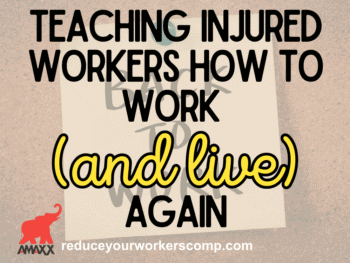
Impairment is a problem in the function of a body part. It can be either temporary or permanent. When it is temporary, the employee is unable to work while recovering from the injury. When the impairment is permanent, the employee retains a residual of the injury after the medical treatment has ended. A permanent impairment’s impact on the employee’s life can range from a very mild impact to a life-altering impact.
Click Link to Access Free PDF Download
“The 6-Step Process To Determine Workers’ Comp Injury Causation”
In a workers compensation claim impairment can be defined as:
- An inability of the employee to use his musculoskeletal system – his limbs, joints, muscles, bones, tendons and ligaments – at the level of use the employee had prior to the injury, or
- An inability of the employee to control his/her neurological functions – the brain, spinal cord, and peripheral nerves – at the level of use the employee had prior to the injury.
A medical provider treating an injured employee will utilize various medical approaches and treatments until the medical provider believes the employee’s medical condition will not improve further. Either the employee has fully recovered from the injury, or the employee’s medical improvement has stopped and the employee has reached his/her maximum medical improvement. When the medical provider believes there is nothing more that can be done medically for the employee, the medical provider will assess whether or not the employee has lost any functional ability.
If the employee has any decrease in functional ability, the medical provider will assign an impairment rating, also known as a disability rating. In 42 states the medical providers will use one of the various editions of the American Medical Association Guides to the Evaluation of Permanent Impairment to establish the level of impairment. In 8 states – Florida, Illinois, Minnesota, New York, North Carolina, Oregon, Utah, and Wisconsin – the medical providers use a state-specific guide for the establishment of an impairment rating.
In worker’s compensation, there are two types of benefits, medical and indemnity. The indemnity benefit is divided into four categories (in most states). While the terminology for the types of disability will vary by state, the four categories are:
- temporary total disability (TTD),
- temporary partial disability (TPD),
- permanent partial disability (PPD), and
- permanent total disability (PTD).
Impairment is normally not associated with TTD. If the employee fully recovers from the injury and has no impairment, the employee returns to work and TTD ends.



























I have had multiple cervical fusions and each time I did the impairment rating returned to work in pain done my best to stay upbeat and with success I was able to return full duty and managed myself to understand once you had the surgery, there always room for improvement. I was successful twice, once with a C4 C5 fusion, and another at C5 C6 both separate spread out over ten years apart, both required many years of treatment but I returned nearly 90% each time, our bodies are able to regain some strength but it’s more manageable when you block it with a little reasoning, I used prescriptions at first then changed it to working outside of the box and began exercising my limits, eventually I found it’s basically mental in that you must focus your innermost energy to block out that which restrains you the most, crazy right. It was either getting in shape and quit complaining or take a pay cut and sit on the sidelines. I prefer wealth, I prefer fun, I prefer doing it the way I want. That pain kept me from being myself, it kept me from my friends my family and everything I wanted in life. I know it’s not easy, getting in shape and staying fit is painful, no dull moments in staying fit. Probably everyone that reads this is gonna think I’m nuts, or some sort of a joke. Well I’m am nuts and it’s no joke, I’d love the pain killers and the easy street but I know I’d fall right back down that hole keeping me in pain. If you have any issues with helping yourself, exercise ain’t for you. I had an L5 S1 low back surgery when I was in my twenties, back then it was a huge scare I was out a year, I was told I was too young to go through it, and I’d never see 100% they were wrong, I got fit, I got my 100% and worked offshore for twenty years before I had my first neck injury. I’m on my third now at C7 T1, it’s rough. I’m managing it, but I know the road to success is going to be a challenge at my older age. I’m not gonna give up hope, I may not win but I’ll do my best. Exercise is the key to all rejuvenations, yup it will be painful. I started to realize if I’m in pain I’m awake because when I’m not I know I’m dreaming. What do they say” No pain No Gain” …
I have a 26 % rating and have been deducting that from my annual fed tax. I used to have the code sections that speak to this, but can not find them now. Does any one know the Code and section numbers.
Hi I had1 failed spinal fusion with hardware,then I had 1 more spinal fusion with hardware,then 1 anterior fusion,do you know what the impairment rating would be thank you….
I was injured at work in 2014 in Texas and had two surgery’s Knee and Back and have received a 9 % impairment rating. I have since relocated to Florida and I was told I would have medical regarding these two injuries for life if I was able to find med Professionals that would work with the Texas fee schedule. I did and now workers comp denies any procedures my doctors request saying they are not medically necessary. My doctors have told me I need legal representation to be treated since the injuries are under workers comp. My independent ins. will not cover any procedures and I am suffering and only able to use meds for pain as they will not approve nerve blocks or anything other than drugs . I need Help
I would like to know if workmen’s compensation responsible to pay me anything they have released me back to work full duty but i still have back pain and I know it will worsen in the years to come I just want to know do they owe me anything for being hurt on job besides workmen comp.